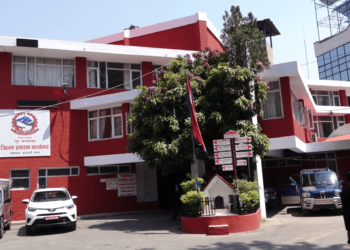KATHMANDU: Nepal Police revealed a case of kidney trafficking in which a gang of traffickers involved in kidney trafficking turned out to be 12 persons, including a people’s representative, doctors and police among many others earlier this week.
Human Trafficking Investigation Bureau of Nepal police in Chitwan arrested 12 persons including 3 doctors of Chitwan’s College of Medical Sciences.
According to SSP Dev Bahadur Bohora, the Chief of HTIB, the arrested people in kidney trafficking allegation include 3 doctors, 1 people’s representative (Ward Chairman) and a legal practitioner among many others.
HTIB team arrested 9 from Lalitpur on Sunday whereas the other 3 gang members were arrested in Chitwan on Saturday. Sources claim that Lalitpur had issued an arrest warrant against the alleged group of traffickers.
According to the police, the arrested include Gopal Maharjan the Ward Chairperson of Lalitpur-3, Dr. Rakesh Kumar Burma, Dr. Suprabhat Shrestha and Dr. Bal Krishna Kalakheti of Bharatpur Medical College, Chitwan and advocate Ramesh Kale among others.
Ward Chair Maharjan is alleged in kidnapping because he has a certified fake relationship between the donor and the patient.
According to SSP Bohora, incumbent Sub-inspector of Police Bhim Prasad Khanal and suspended Sub-inspector Yogendra Raj Thapaliya are also arrested for their involvement in the trafficking case.
The police nabbed Thapaliya in connection with the kidney trafficking of Kabhre Bangthali’s Vishnu Khadka by taking him to India. Five, including the other 2 women, are also arrested in the case.
According to SSP Bohora, 12 people were found involved in the illegal kidney transplantation executed in Bharatpur Medical College, Chitwan on June 10, 2019.
There had been a similar incident in Nidan Hospital, Pulchowk, Lalitpur on October 16, 2019. After finding that fake nephew was created to get kidney donation, the police had arrested 5 including doctors and legal officers.
They had prepared a document of one person and taken the kidney out from another person making the fake document.
These two incidents which took place in Chitwan and Lalitpur in a short span of a year are the representative ones that show the illegal business going on.
According to Nepal Police, kidney trafficking started in Nepal since 1993. Although there are no formal statistics of the years before, there have been 10 public incidents of kidney trafficking since 1993/94.
The police spokesperson Niraj Bahadur Shahi applauds police efficiency for successfully bringing out 10 such incidents to light.
“With active and efficient moves from police 10 incidents of kidney trafficking came to public light, in more than 50% of such cases fake relatives are presented as a donator of the kidney.
How is trafficking possible?
Human Organ Transplantation Regulation and Prohibition Act 1998 provisions in Chapter 3(A) Clause 14 that a healthy relative can donate their kidney to the relative.
Abusing the provision of the traffickers in league with the hospital staff and government officials prepare fake relatives, verify the document and execute the act of kidney trafficking.
According to the experts, the instances of kidney trafficking of Nepalis are greater in India than in Nepal. With financial temptations, the Nepalis are taken to India and the kidneys are seized from them.
“First the traffickers in India make a deal with the kidney patient’s relatives and fix the money,” Former DIG Keshav Adhikari described the procedure the gang goes through, “after settling the deal, in coordination with the doctors, they send the blood group and other details to the contacts in Nepal who find the prospective donors and work out the documents.”
According to him, the swindlers target the impoverished, illiterate, and gullible Nepalis for the purpose.
The experts claim that the racketeers arrange for the settings with the bureaucrats and prepare all the documents. On the basis of those documents, the prospective donors are taken to India and their kidneys are extracted. These traffickers sell the kidneys up to 10 times more than what they paid to the donors.
Former DIG Hemanta Malla says that many of such victims of kidney trafficking turn into traffickers themselves, as they get acquainted with the gang and the procedure together with the method of earning easy money.
Legal provision
The police have started the investigation against the 12 alleged traffickers under the Human Trafficking Control Act, 2007. Under this Act, anyone taking out other’s organs illegally can be imprisoned up to 10 years and maybe penalized from 200 thousand to 500 thousand rupees.
Curbing measures?
Bureau Chief SSP Dr. Bohora says that human organ trafficking is a crime and none that commits this crime can be spared.
He claimed that the police have intensified their campaign against trafficking. Yet he regards the self-efforts and awareness imperative to curb such criminal activities.
Former DIG Malla also believes revising the legal provisions and launching an awareness campaign can be very effective in controlling this heinous crime.
He regards updating the status of the traffickers and their record along with monitoring their activities closely.









Comment